
Exclusive Interview with Briatore
Atlas F1 Editor in Chief
Flavio Briatore is anything but a typical Formula One team boss. He wasn't a racing driver in the past, nor was he a mechanic. The businessman who appeared out of nowhere some 15 years ago to manage the Benetton F1 team is by now one of the most successful managers in the sport, with an envious cadre of talented drivers and a surprisingly successful team in his realm. Biranit Goren dropped by his office at the Renault F1 factory in Enstone for a chat about Mark Webber (why he won't go to Williams), Mike Gascoyne (why he went to Toyota), cheating allegations (why he doesn't care), and his retirement plans (he'll leave before Michael Schumacher). Exclusive for Atlas F1
"This is a very good place to live if you have to work," he continues. "If I woke up and there was sun and blue sky I wouldn't want to work. But in this kind of weather, what have you got to do? It's better this way, less distractions."
The Star Maker
Briatore has his hands full at the moment, so it's just as well that there's no sun to distract him. The businessman who came into Formula One some 15 years ago without any background whatsoever in racing, is now managing one of the most exciting teams on the grid as well as a successful drivers' management program - now co-owned by himself and Renault - that has seen him bring into Formula One the likes of Giancarlo Fisichella, Jarno Trulli, Mark Webber and the current flavour of the month, Fernando Alonso. Say what you will about Briatore, but the man who snatched Michael Schumacher from under Eddie Jordan's nose just one race after the German debuted in Formula One sure knows how to spot a talent when he sees one.
His philosophy is simple: find them when they're young, inexperienced and obviously cheap, and groom them for the long term. After ten years of running the management company, Briatore probably has more options to choose from than any other team around, with the exception perhaps of McLaren - who also run a similar grooming program for young drivers. To Briatore's credit it has to be said that he sticks with the drivers he signs long before they become Hot Shots. And Australian Mark Webber is a fine example of that.
Webber wasn't exactly lined up with offers to enter Formula One and Briatore was the one who gave him a chance. Two years after he debuted with Minardi, suddenly the Australian is talked of as prime candidate for a Williams seat in 2005, when Juan Pablo Montoya moves to McLaren. But don't count on the Webber-to-Williams move just yet: the flip side of Briatore's philosophy is that he practically owns the drivers, and Webber is no exception.
"We manage Mark Webber and we have an option on him in 2005, so we have to decide whether to exercise this option," Briatore explains.
Briatore: "Look, you never know in Formula One what the situation will be like in more than a year's time, but at the moment Webber is part of our group and he's with us.
BG: Did you at all get an approach from Williams?
Briatore: "There was no approach, but the speculations don't surprise me. I always believed in Webber and I invested money in him and now he looks good so sure for Frank [Williams] it's cheaper to get Webber now than to groom him over years. But he is our driver and we will see what happens next year, because in 2005 we have the possibility to have him back in Renault or leave him in Jaguar for another one year and then bring him back to our team. But he is ours, and he is a long term investment."
BG: It sounds from what you're saying that we're not going to see Webber in a Williams
Briatore: "No, no, I am not saying right now what is going to happen because I myself don't know how things will turn out. For example, if I feel that I don't need Webber because [Jarno] Trulli is great or [Franck] Montagny is great - and at the same time Frank [Williams] approaches me and asks for Webber, then maybe if I can give up Webber then I will do this for Frank, because my relationship with him is very, very good. But right now Mark is very happy with Jaguar and we have another year to decide on our 2005 line up. So we'll see."
BG: I must admit that the possibility of Webber and Alonso together in one team, while Montoya and Kimi Raikkonen are at another, is very appealing. We've never had something quite like this in Formula One
Briatore: "I agree, yes, it's very good and it's definitely something we're thinking about. But we'll see how it works out."
BG: So I take it there's no doubt about Alonso staying in Renault in 2005?
Briatore: "Yes, that is the plan right now, sure. I believe he's a talent, sure, but we need to see in the future how his talent develops. You never know. There are many drivers who came into Formula One with a lot of talent and ended up going nowhere. When you have a talent like Fernando has, you can develop it only if you work very hard. If Fernando keeps working hard, then he's going to have a great future."
Briatore: "Well, you know, in our driver development program we believe in working with young talents for the long term. You find someone you believe in and you invest in them a lot of time and money, and the reward is that they are with you when they are capable of delivering results. It's easy if you have the money to go and buy someone like Raikkonen or Montoya or Schumacher, but it's more difficult to have good drivers when you don't have that kind of big money, and the key then is long term development. Then you get to build your own stars, like Alonso or Webber or now Montagny. We had Trulli and Fisichella as well, so I think our management program proved worthy.
"Take Michael [Schumacher] for example: for Benetton it was impossible to keep him [after 1995]. We won the Constructors' Championship in 1995 and he won two consecutive World Championships with us - so Michael became a very big star and there was no way we were able to pay him the kind of money he's getting at Ferrari. We knew we were going to lose Michael, it was clear. I knew, after five years, it was time for him to move on to a bigger and richer team. And there's no doubt he made the right choice."
BG: So do you see history repeating itself with Alonso?
Briatore: "Well, we're surely going to try to win with him Championships like we did with Michael! And if we win with him two Championships then it will be a big return on our investment in him.
BG: I am curious how you cope with the inherent conflict of interest between managing a team and managing a driver. What do you do when you realise, for example, that holding a driver in your team could possibly take away his chance of moving to a winning team?
Briatore: "Well to me there is no conflict of interest - to me the interest is the team. There is no conflict of interest. I groom the drivers and I invest in them for the sake of the team and for the interest of the team. And the decisions I make are in the interest of the team, simple as that. We invest in young people so that we will have a choice for the long run and to not have to bid big money on the current stars. But the investment in the drivers is for the sake of the team and part of the team strategy."
BG: In that case, what happened with Fisichella? He was no longer suitable for the team strategy?
Briatore: "Well... Fisichella was managed by us and one day he decided he wants to walk by himself. So he's walking by himself now; he made his own choices.
"Fisichella at one point had a kind of assistant manager - you know, the guy that carries your bags for you - and this guy I guess convinced Giancarlo that he could do a better management job than us, so one day Fisichella came and said he wants to be independent and I said fine, no problem. If someone doesn't want us to manage him I am not going to force him. So we canceled our agreement and he was on his own."
Briatore: "No, absolutely no. In fact I told Giancarlo that he'd be better off staying with us - he had the choice to stay with us and I'd have been happy to have him. But his new manager negotiated with me and we never came to an agreement, it's as simple as that."
BG: The rumours back then suggested you were only willing to offer him a one year contract whereas he wanted three years
Briatore: "No, that really wasn't the issue. The problem was money, that's the whole story. He wanted too much and I had no reason to pay such sums, when I had other talents waiting for a seat. So he made his choices, and that was it."
The Renault Gamble
Briatore's involvement with Renault is above all testimony to the man's business talent and mastery. In 1997, just days after he left his job as team principal of Benetton F1 and with no idea what to do with his time, he came across a report in a magazine about Renault's decision to end their involvement in Formula One. "I read that Williams and Benetton are looking for an engine and there were speculations they'll have Ford or Toyota or Honda, and I thought to myself, these people have nothing," he recalls.
Briatore saw a business opportunity in the vacuum Renault was leaving behind - teams need engines in such short notice - and so contacted Renault and offered to buy their Renault Sport factory. And so Supertec was born, and Briatore's subsequent ticket back to Formula One as managing director of Renault F1 Team.
"Basically I called Renault and offered to buy Renault Sport from them," he says. "They were just going to shut it down and I told them it's a waste, really, to lose all the technology and the people. I told them, give it to me - I will pay the people's salaries and the maintenance - and if one day you decide to return to Formula One then you will still have all your technology and people in place. Otherwise they will all just disappear.
Renault made the decision some three years later, and by 2001 Briatore handed Supertec back to its prior owners and became managing director of Renault F1, first running the team under its previous name of Benetton and as of 2002 under the full marque and glory of the Renault name. And, in two years, the team had proved to be among the leading forces of the 2003 season - with a dominant win as the cherry on the icing. This, only two years after Briatore's cars were battling at the bottom of the grid against Minardi.
The Italian is cautious, however, in celebrating the team's fast return to the front of the grid. "People think Renault is just a continuation of Benetton but in reality it's not - it's still very young," he says. "We effectively took over the team only two years, and it's not easy to build up the team again. When we arrived here there was nothing - I was really ashamed because I was here with Benetton and we were still racing at the front in 1997, and in 3-4 years everything was gone. But, you know, you work hard, put together a group of people and stabilise your business."
BG: Were you surprised at Renault's competitiveness this season?
Briatore: "I was surprised of our achievements in the middle and end of the season, not at the start, because the fact that we chose to test on Friday mornings gave us an advantage at the beginning of the season. But our fear was the middle of the season - we expected the top teams to make up more ground than us in mid-season development because they were testing more than us during the season. So I must admit I was surprised that we remained competitive throughout the season."
BG: On the other hand, looking at the points situation, there's still quite a big gap between Renault and Ferrari
Briatore: "I don't think so, because this year we retired in six races because of mechanical failures. At the same time Ferrari had no problems, and Williams and McLaren had very little problems. So if you consider us finishing in all those races at the same position from which we retired, then I believe we are very close if not even better than McLaren.
"The year before we were fourth but very close to the fifth. This year we are fourth, but very close to the third. This is an improvement. A miracle in this sport is very rare, very difficult. So you have to look at it in realistic terms and we made realistically a very big improvement, and this is what a team should be looking for - a way to move forward."
BG: Seeing as reliability was a primary problem for Renault, how do you feel the rule changes for next year will affect you? After all, if the rules had not changed you could continue in the same path you are on now and focus on improving reliability
Briatore: "Well I don't think the new engine rule is a big issue. I believe we are OK with the engine for next year. Maybe in the first 3-4 races we will see reliability issues because it takes time to make this work. But I don't see this as a handicap for Renault only - it is something new for everyone so if anything it will be an advantage for us because we go back to a level playing field as far as engine development goes. But I don't know what our competitors are doing so it's very hard right now to evaluate how truly competitive we will be next year."
Briatore: "Well so far in testing we were quicker with our old car than their new car... so if this is their new car it's nothing."
BG: You said on several occasions this year that Renault is quite significantly down on horsepower compared to the top teams. Do you expect this to change next year?
Briatore: "You know, everybody talks about engine power but really, a strong engine alone doesn't win you the Championship and it's not the most important part of the package. We won the Championship [in 1994] with Michael [Schumacher] against Honda and Renault and Ferrari, with a V8 Ford that had 80-90 horsepower less! And this year we won a race with an engine that is not so strong. So what we need is something normal - not so far from the best engine, but not necessarily the best. So like everything, the key is the overall package. I don't want to be 100% in one thing and 50% in another. I prefer to be 90% in every aspect of the package."
BG: What effect, if at all, does technical director Mike Gascoyne's departure to Toyota has on Renault's progress?
Briatore: "You know, for me it's fascinating. When Ross Brawn or Rory Byrne arrived in Formula One, nobody knew them. Then they became stars when they were with us at Benetton and they all left for Ferrari. So we found new talents. I am very pleased to create superstars who then leave us for a lot of money - unfortunately I get nothing back! But seriously, it's good for them. For us it does not matter. A Formula One team is not a one man band anymore - you need a group of people. Gone are the times when you had to rely entirely on the talent of someone like John Barnard. Now what you need to do is work efficiently in the wind tunnel. The more hours you run the more possibilities you have.
"So I don't believe anymore in the Guru in this kind of business. And if someone feels he no longer fits in the group then he'd better go. With Mike we have a very good relation, so I understand why he wanted to go to Toyota."
BG: "And why is that?"
Briatore: "Well, I think the motivation was financial. You need to understand that two years ago Mike was in the market and nobody wanted him. And now he's been offered big money. So I understand him."
BG: As far as working on the 2004 car, his leave won't hamper your progress?
Briatore: "No, absolutely not. Look, before you even build a car you must build your organisation. You need a strong foundation in the team that doesn't rely just on one person or one component before you can actually build a good car. Mike leaves a team with a strong foundation like that and I think that this is going to be his job in Toyota now - to build a strong foundation. Whatever job Mike is doing now for Toyota - organising the team - that takes two years. This is something he's very good at and for that he's definitely the right guy for Toyota."
BG: So if Gascoyne's work at Renault is done, does that indicate you feel you are ready to become Championship contenders next year?
BG: Toyota?! You see them as a possible threat next year?
Briatore: "Maybe... OK, I don't actually think they will be at the front next year, but who knows? Maybe they'll be a surprise."
BG: How much longer do you plan to do this job?
Briatore: "I see myself another two, three years in Formula One maximum and after that doing something else, not in racing. I will probably keep the drivers' management company because it's nice like that, to work with young people, but I won't stay in this job for long. It's not good for a person to stay in one place too long and it's not good for a team to have the same people all the time. I'll give the opportunity to someone else to do that job because, you know, if nobody retires then nobody is growing."
BG: Yes, well, we keep saying that to Michael Schumacher but he doesn't seem to listen...
Briatore: "Well Michael is very young, what is he? 37?"
BG: 35 next month
Briatore: "Only 35? Well, he's young then. But I don't know what he plans to do. I think as long as you enjoy your job and feel you can do it well then there's no reason to leave. I'm sure he will leave when he's had enough.
"For me, I feel that this time will come soon. Maybe in two or three years."
BG: And then what?
Briatore: "And then I will just get up and leave, go wherever life will take me."
Flavio Briatore probably has one of the thickest skins in the Formula One paddock. If the other team principals had to endure half the allegations Briatore faced in over a decade, you can be sure there would be libel lawsuits flying around the place. Yet Briatore is either wary of suing or is truly immune to such accusations.
Briatore remains unflustered when he's asked about the cheating accusations. "Look, people love to rubbish," he says without a trace of annoyance. "We know, and Ross Brawn knows, and Michael Schumacher knows - those who were there, we know the truth. But you have to remember, in 1994 it was very difficult for the Formula One establishment to accept that Benetton is beating everybody. Teams like Williams, McLaren, Ferrari, with a big budget and a big ego trip got beaten by T-shirt makers. So for sure Benetton winning the Championship was demotivating for Formula One.
"It's like in rugby, if you'd suddenly have the team of Repubblica di San Marino beating England then you'd just disqualify the championship. So people tried to do everything possible to make our lives difficult in 1994 and to this day try to discredit our achievement. But that's life and it doesn't bother me any more.
"It bothered me then, because sometimes it was really just too much. Like the plank in Spa" - where Schumacher was disqualified from a win, after his undertray plank was found to be worn by a few milimetres more than allowed in the regulations - "that was just ridiculous. It was pushing logic and getting tiring.
"But really, I just don't care about it anymore."
The view from Flavio Briatore's office in Enstone, England, is truly nothing to write home about: dull plains covered by typical grey sky with nothing to break the horizon but the flat complex of buildings that make up the Renault F1 chassis factory. A man as colourful as Briatore just doesn't seem to belong in the British winter gloom.
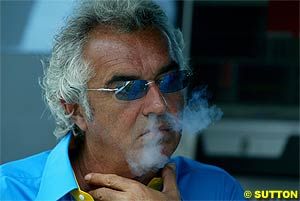 Yet this is the place the managing director for Renault F1 calls home. Not the house in Kenya, not the luxury complex in Sardinia. Not the Virgin Islands or Monaco or Rome - or any of the other illustrious locations he lived in before. "I prefer it here, actually," he says, stretching his legs behind a table so big it could probably house the Minardi pit garage.
Yet this is the place the managing director for Renault F1 calls home. Not the house in Kenya, not the luxury complex in Sardinia. Not the Virgin Islands or Monaco or Rome - or any of the other illustrious locations he lived in before. "I prefer it here, actually," he says, stretching his legs behind a table so big it could probably house the Minardi pit garage.
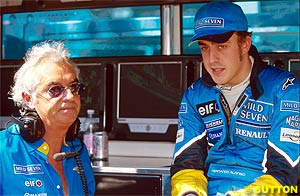 BG: So does that mean Webber won't be moving to Williams in 2005 as the rumours suggest?
BG: So does that mean Webber won't be moving to Williams in 2005 as the rumours suggest?
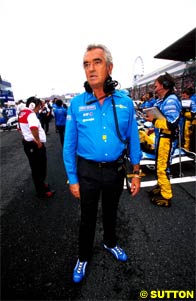 BG: But how do you hold on to someone like Alonso in the long term? There's already rumours and speculations about Ferrari trying to snatch him away
BG: But how do you hold on to someone like Alonso in the long term? There's already rumours and speculations about Ferrari trying to snatch him away
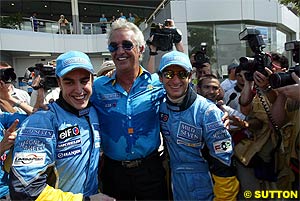 BG: And that's why you did not renew his contract with Benetton the year after?
BG: And that's why you did not renew his contract with Benetton the year after?
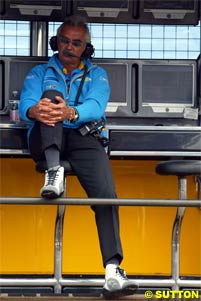 "So we signed a deal and I took on myself the costs and sold engines to Williams and Benetton and others. So it was a very successful business move. But it also proved very good for Renault because when they decided they want to return to Formula One, everything was ready to go. They didn't have to start from zero."
"So we signed a deal and I took on myself the costs and sold engines to Williams and Benetton and others. So it was a very successful business move. But it also proved very good for Renault because when they decided they want to return to Formula One, everything was ready to go. They didn't have to start from zero."
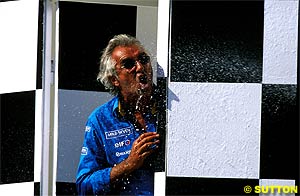 BG: The fact that McLaren are already testing with the new car should supposedly give them an advantage, no?
BG: The fact that McLaren are already testing with the new car should supposedly give them an advantage, no?
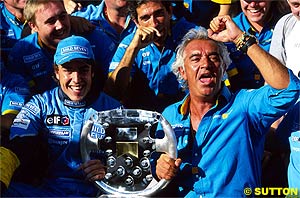 Briatore: "No, no, I am not a dreamer! I just hope we continue to be competitive but it's hard right now to know where we stand. I don't know what Ferrari are doing, what McLaren or Williams are doing, or what Toyota are doing."
Briatore: "No, no, I am not a dreamer! I just hope we continue to be competitive but it's hard right now to know where we stand. I don't know what Ferrari are doing, what McLaren or Williams are doing, or what Toyota are doing."
Sidebar: The Cheating T-Shirt Makers
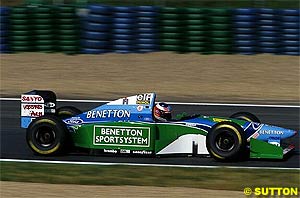 Almost a decade since Michael Schumacher won the 1994 World Championship with the Briatore-managed Benetton team, and journalists and fans alike seem to claim with growing confidence that the 1994 Benetton was involved in somewhat illegal activity. Or in plain words: Briatore's team was cheating. No one has any evidence to the fact, but going on the old adage that there's no smoke without fire, the allegations have long become a matter of fact that gets repeated every time the 1994 season is mentioned.
Almost a decade since Michael Schumacher won the 1994 World Championship with the Briatore-managed Benetton team, and journalists and fans alike seem to claim with growing confidence that the 1994 Benetton was involved in somewhat illegal activity. Or in plain words: Briatore's team was cheating. No one has any evidence to the fact, but going on the old adage that there's no smoke without fire, the allegations have long become a matter of fact that gets repeated every time the 1994 season is mentioned.
Please Contact Us for permission to republish this or any other material from Atlas F1.
